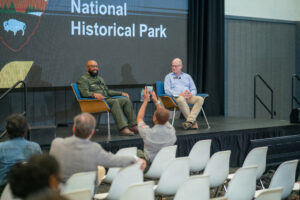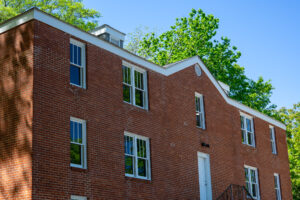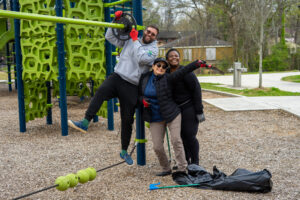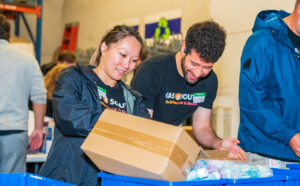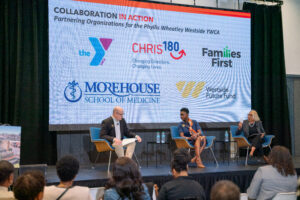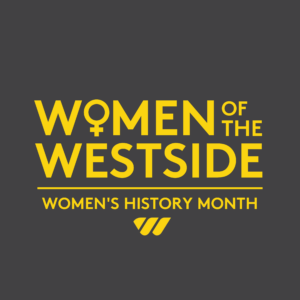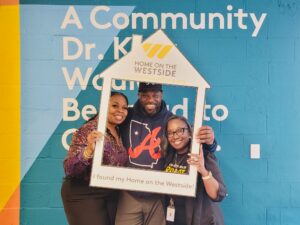Atlanta’s historic Westside is a living testament to the city’s rich past and enduring legacy. Throughout the community, streets and landmarks tell the stories of trailblazing leaders whose contributions shaped Atlanta—and the nation.
In honor of Black History Month, we are launching a blog series exploring the namesakes of four significant streets that run through the historic Westside. This edition highlights Cameron M. Alexander Boulevard, a key corridor in the heart of English Avenue that stands as a tribute to a man devoted to faith, service, and community empowerment. Formerly known as Kennedy Street, it was renamed in 2010 to honor Reverend Cameron Madison Alexander, a towering figure in Atlanta’s religious and civic life.
A Life of Leadership and Service
Born in Atlanta on February 12, 1932, Cameron M. Alexander was an accomplished student-athlete and musician, he played football, ran track, and performed on the saxophone. His love of history guided him academically, providing a foundation for the ministry that would define his life’s work. In 1948, he graduated from Booker T. Washington High School.
After high school, Alexander attended Florida A&M University, where he was a member of the renowned Marching 100 band. He later served in the U.S. Air Force before continuing his education at Morehouse College, where he studied under the mentorship of the legendary Dr. Benjamin E. Mays. He earned his Master of Divinity degree from the Morehouse School of Religion and went on to hold leadership positions in multiple institutions, including the Morehouse School of Religion and the Morehouse School of Medicine.
The Pastor Who Transformed a Community
Rev. Alexander’s journey in ministry began in Cartersville, Georgia, and took him to Macon and Savannah, where he became known not only as a spiritual leader but also as a civil rights advocate. In Macon, he played a key role in desegregating city buses, lunch counters, and even Mercer University. In Savannah, he partnered with financial institutions to revitalize entire neighborhoods, demonstrating his belief that the church must be active in uplifting communities.
In 1969, while visiting Antioch Baptist Church North as a guest preacher, Rev. Alexander delivered a sermon so powerful that the congregation voted the very next day to call him as their pastor. Over the next 49 years, he led Antioch with a vision that extended far beyond the pulpit. Under his leadership, the church became a beacon of hope, offering housing assistance, education programs, job training, and international missionary work. He trained, licensed, and ordained more than 600 ministers, 150 of whom went on to pastor their own churches.
For nearly five decades, Rev. Alexander led Antioch Baptist Church North, transforming it from a modest congregation into a thriving institution with over 14,000 members and more than 75 ministries. His influence extended far beyond the church walls, shaping the English Avenue community and inspiring people across Atlanta and beyond.
A Street Named for a Servant Leader
Rev. Alexander’s deep commitment to English Avenue and the surrounding Westside community was unwavering. He firmly believed that Antioch Baptist Church North should remain in the city, where it could have the greatest impact on those in need. His leadership went beyond his congregation—he was an advocate for affordable housing, economic development, and social justice.
Rev. Alexander’s influence reached far beyond Atlanta. He served as President of the General Missionary Baptist Convention of Georgia for 29 years, led international humanitarian efforts in Haiti, South Africa, and Brazil, and was honored by institutions such as the Atlanta Business League and the Martin Luther King Jr. National Historic Site. His sermons and speeches have been preserved in the Library of Congress, ensuring that his voice will continue to inspire future generations.
In 2010, in recognition of his contributions, the City of Atlanta renamed Kennedy Street as Cameron M. Alexander Boulevard. The street, which runs through English Avenue, serves as a lasting tribute to his dedication to the neighborhood. English Avenue, historically significant but long impacted by disinvestment, is now the focus of revitalization efforts, and the boulevard bearing Rev. Alexander’s name stands as a symbol of resilience and faith in the community’s future.
Westside Future Fund’s Work on the Boulevard
When you walk or drive down Cameron M. Alexander Boulevard, you are traveling along a road that represents more than just a name—it embodies a legacy of service, faith, and transformation. His work and vision live on, not just in the street that bears his name, but in the community he uplifted and the countless lives he touched.
As Westside Future Fund (WFF) continues its transformational work across Atlanta’s historic Westside, the intersection of Cameron M. Alexander Boulevard and James P. Brawley Drive has been a focal point for restoration efforts.
At this corner stands the Yellow Store—once a bustling commercial hub, later overshadowed by disinvestment, gang violence, and the local drug trade. Since acquiring the property in 2019, WFF has eliminated illicit activity and plans to restore the building as a mixed-use space, offering both residential and commercial opportunities to serve the community.
Diagonally across the street, St. Marks AME Church is undergoing its own transformation. Led by Pastor Winston Taylor, this restoration project is revitalizing the church as a gathering space for local residents and community events—preserving both the structure and the cultural identity of the corridor.
Just east of the intersection, a row of high-quality, affordable single-family homes now stands, made possible by the Atlanta Police Foundation’s (APF) Secure Neighborhoods Initiative. In collaboration with Pulte Homes and the Arthur M. Blank Family Foundation, APF aimed to strengthen relationships between communities and the officers who serve them. WFF partnered with APF to identify legacy residents for the homes, which also provide housing for select Atlanta Police Department officers.
Across the street, the @Promise Center serves as a vital resource for Westside youth, offering mentorship, education, and support to empower the next generation.
With each of these efforts, WFF is advancing its mission to restore and revitalize the historic Westside—ensuring its neighborhoods remain vibrant, safe, and full of opportunity—while keeping the legacy of Cameron M. Alexander and other historic community leaders at the heart of the work.


